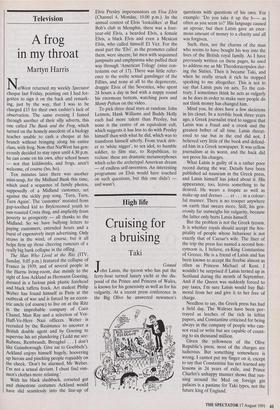Television
A frog in my throat
Martyn Harris
NatWest returned my weekly Spectator cheque last Friday, pointing out I had for- gotten to sign it on the back and remark- ing, just by the way, that I was to be charged £15 for their own cashier's lack of observation. The same evening I fumed through another of their silly adverts, this one called The Bank and the Frog, which turned on the homely anecdote of a biology teacher unable to cash a cheque at his branch without bringing along his entire class, with frog. Now that NatWest has gen- erously decided to stay open until 4.30 p.m. he can come on his own, after school hours — not that kiddiwinks, and frogs, aren't welcome, of course (ho, ho).
Ten minutes later there was another mini-soap, for the Midland Bank this time, which used a sequence of family photos, supposedly of a Midland customer, set against the sickly pop song, 'Turn, Turn, Turn Again'. The 'customer' mutated from gap-toothed kid to Brylcreemed youth to sun-roasted Costa thug, and implicitly from poverty to prosperity — all thanks to the Midland. So we have bullying letters to paying customers, extended hours and a burst of expensively inept advertising. Only straws in the wind, of course, but it all helps firm up those cheering rumours of a really big bank collapse in the offing.
The Man Who Lived at the Ritz (ITV, Sunday, 9.05 p.m.) featured the collapse of France in 1939, and of several people in the Harris living-room, due mainly to the sight of Joss Ackland as Hermann Goering, dressed in a furious pink plastic forehead and black taffeta frock. Art student Philip Weber has found himself in Paris at the outbreak of war and is forced by an eccen- tric uncle (of course) to live on at the Ritz in the improbable company of Coco Chanel, Man Ray and a selection of Vot- Haff-Ve-Here Nazi officers. Weber is recruited by the Resistance to uncover a British double agent and by Goering to supervise his art plundering ('Ledd me see: Rubens, Rembrandt, Breughel . . . I don't like Gainsborough. Give zat to Goebbels'). Ackland enjoys himself hugely, hoovering up heroin and pinching people roguishly on the cheek. 'Don't be alarmed, Mr Weber. I'm not a sexual deviant. I chust find vim- men's clothes more relaxing.'
With his black slashback, corseted gut and rhinestone costumes Ackland would have slid seamlessly into the line-up of
Elvis Presley impersonators on Viva Elvis (Channel 4, Monday, 10.00 p.m.). In the annual contest of Elvis lookalikes' at Bad Bob's club in Memphis, there was a four- year-old Elvis, a bearded Elvis, a female Elvis, a black Elvis and even a Mexican Elvis, who called himself El Vez. For the most part the `Elvi', as the promoter called them, were sincere, fat men with sequinned jumpsuits and emphysema who puffed their way through 'American Trilogy' (nine con- testants out of 17). There was little refer- ence to the svelte sexual gunslinger of the Fifties, and none at all to the degenerate, druggie Elvis of the Seventies, who spent 24 hours a day in bed with a nappy round his enormous bottom, watching porn and Monty Python on the video.
To pick three dead stars at random: John Lennon, Hank Williams and Buddy Holly each had more talent than Presley, but none is the centre of an equivalent cult, which suggests it has less to do with Presley himself than with what he did, which was to transform himself utterly. From truck driv- er to 'white nigger', to sex idol, to humble soldier, to film star, to Republican, to recluse: these are dramatic metamorphoses which echo the archetypal American dream — of endless self-invention. An interesting programme on Elvis would have touched on such questions, but this one didn't — and wasn't.


















































 Previous page
Previous page